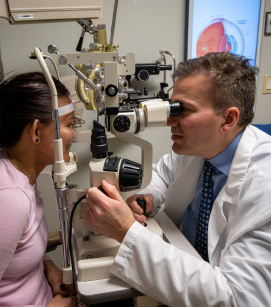OZEMPIC & Blindness
An Honest Look at Eye Health & Obesity in America
We all know the Ozempic craze is gripping the nation right now. It is the latest in a series of weight loss fads that is not only causing shortages of much needed diabetic medications, but also serious side effects that are harming other facets of the anatomy. One of those, which is the more serious of the reported side effects, is blindness. As a leading optometrist, we turned to Dr. James Dello Russo for the truth about what exactly is going on.

NYLM Q: There have been recent studies that prove those taking Ozempic and other semaglutides can lead to an elevated risk of developing a very rare form of vision loss/blindness. How rare is this, and should those on their health journey be concerned?
Dr. Dello Russo: There is a rare condition associated with Ozempic and other semaglutides called a non-arteritic anterior ischemic optic neuropathy or (NAION for short.) This condition is characterized by a disruption in blood flow to the optic nerve which can cause ischemia and permanent damage. It is analogous to a stroke of the optic nerve that can result in blindness.
The emerging concern is the potential link between semaglutide and NAION. Symptoms of NAION include sudden vision loss in one eye, or blurred vision in one eye, or a visual field defect. The risks of developing this condition are quite rare, so those taking Ozempic and other semaglutides shouldn’t be concerned.
We have seen recent reports show the connection between obesity and serious eye diseases, nearsightedness, cataract disease, glaucoma and more. This is especially concerning to eye experts as obesity rates are forecasted to increase by 64% in the next 25-years.
NYLM Q: What are some weight management and healthy lifestyle choices that can help in preventing or slowing down the progression of vision problems related to obesity?
Dr. Dello Russo: That’s a great question. With all of the information on the internet, I still suggest that anyone seeking to lose weight, or change their diet speak with a medical professional before embarking on this effort. It’s better to be safe in these kinds of cases, especially if someone is what is considered “obese.
The first thing to tackle are dietary changes. Portion control is a big part of that. But you also need to focus on eating whole, unprocessed foods, including fruits, vegetables, lean proteins, and whole grains. Limit processed foods, sugary drinks, and excessive saturated and trans fats. For eye-oriented healthy fare, incorporate foods rich in antioxidants like leafy greens and colorful vegetables. Consume omega-3 fatty acids, found in fish such as salmon, to support retinal health. When it comes to weight loss, you need to focus on sustainable, gradual weight loss instead of rapid, extreme diets. Consult with a healthcare professional or registered dietitian for personalized guidance to maintain a healthy BMI.
The second part of this is regular physical activity. Aim for at least 150 minutes of moderate-intensity exercise per week, such as brisk walking, swimming, or cycling, to manage weight and improve cardiovascular health. It’s all about consistent exercise and daily movement. Opt to take the stairs or walk to your destination when you can. It will drastically improve your physical health.
Then there are related health conditions we all have to consider. The two most common problem areas are blood pressure and cholesterol. For both, lifestyle changes such as healthy diet are paramount, but you may also need to take medication, depending on what your physician tells you. That includes exercise as your doctor is who will know what is best to help you. For those who have diabetes, you must diligently manage your blood sugar levels through diet, exercise, and medication as prescribed by your doctor.
When it comes to your eyes, make sure you schedule regular comprehensive eye exams to detect any early signs of eye problems. And last, but certainly not least, getting enough sleep is important for overall health, including eye health.
Dr. James Dello Russo is one of the most well respected optometrists in the Tri-State area, having cared for patients and their eye health for over 30 years. To learn more about Dr. James Dello Russo,
please visit DelloRusso.com





